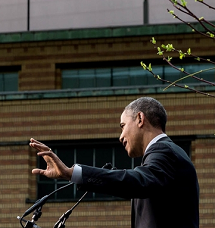Jeffrey Lewis
March 30, 2016
The following is an excerpt of an article published March 29, 2016 by Foreign Policy.
Washington’s traditional nuclear strategy isn’t keeping Europe safe — it’s putting everyone at risk of apocalyptic terrorism.

Photo courtesy of NCC 2016.
When the news of the horrible terrorist attacks on Brussels first broke, I was in Paris, where sympathy for the Belgian capital was enormous. In Paris, among officials and the public, there was a palpable sense of shared fate with other countries facing the threat of jihadi terrorism that rarely makes it over intact to the United States. Insulated by geography and egotism, we tend to respond to terrorism in Europe by issuing travel warnings.
But if nihilistic jihadis blowing up metro stations and airports doesn’t create a sense of solidarity, maybe the possibility of nuclear terrorism will do the trick. We’re about to hear a lot about shared interests as Washington gears up for one of the few items on the security agenda that purportedly interests President Barack Obama — the final Nuclear Security Summit. The president initiated the effort to convene world leaders to focus on improving nuclear security following his 2009 speech in Prague on the subject of nonproliferation. While the process has been valuable, there seems to be little appetite, both in Washington and elsewhere in the world, for continuing Obama’s pet project once he leaves office. So, it’s one last meeting.
The backdrop to the summit will be the revelations over the past few days that the terrorist network that carried out last week’s attacks may also have been targeting Belgian nuclear power plants. There are plenty of reasons to think the facilities themselves are relatively safe. After all, the fuel at these facilities is irradiated — which means that a terrorist group attempting to steal it would have a very unpleasant time handling the hot, radioactive fuel.
